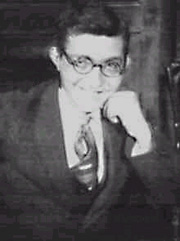
Sarah's Chess Journal
my journal, blog, web log, blog.....about
The History and The Culture of Chess
 Sarah's Chess Journal my journal, blog, web log, blog.....about The History and The Culture of Chess |
 | ||
|
Carlos Torre Repetto was born in Yucatan, Mexico, in 1904. He died, impoverished, in an old-age home in 1978, an obscure chess master. Although he was born in 1904, Torre quit chess in 1926 - at the age of 22 - after playing only two years professionally! Yet he left behind a legacy of brilliance and the promise of being a serious contender for the world championship. Playing against three world champions - Alekhine, Capablanca and Lasker - Torre had a plus score (+1 =2). Playing in a tournament in Chicago in 1925, Torre needed only one win to finish first in a field that included Frank Marshall and Geza Maroczy and Edward Lasker. He lost this game to Edward Lasker. After this tournament, he suffered a nervous breakdown which, while in NYC, manifested itself when he attempted to remove his clothes on a Fifth Avenue bus. He never played serious chess again. After a brief hospitalization, he returned to his native Mexico.
There have been rumors that his breakdown occurred as a result of being jilted by his fiancée. Whether this is true or not is unclear, but it's not generally accepted.
Dr Carlos Fruvas Gárnica, who treated Torre and seemed to be very close to him, reports that Torre, in fact, became a victim of his own success: "In 1926 there was no Mexican politician, generalote, or rich retailer, or monopolistic millionaire that did not want that Torre went to its social gatherings." "...they want to think that Torre lost the reason by some dark cause, I prefer to think that Carlos Torre retired voluntarily from chess not to have to report to that society of crazy people." In his later life it was discovered in interviews that Torre retained his marvelous memory and could recall his games in detail. Quite coherently, he said, "I abandoned chess competition, but never my love for this beautiful game."
A few notes:
1. The game between Torre and Adams (New Orleans, 1920) is purported to be wrongly attributed to Torre. 2. This Adams is also erroneously given the first name of "Edwin". His name was "Edward". 3. Torre did, in fact, play Edward Adams in Chicago, 1925 and won with an amazing double-rook sacrifice. 4. Oddly, Torre, unlike the rest of the world, did not consider his victory over Emanuel Lasker in his famous "windmill" game, an example of great chess: "To tell the truth, I do not consider it a good game, because both of us committed various errors." 5. Possibly his greatest game was against Newell Banks during the Western Open, 1924, in Detroit where he trades his Queen for a Knight and an attack on move 24. 6. The name "Torre" means "Tower". Tartakover once observed that the reason Torre was so successful was that he played with three towers!
7. Gabriel Velasco is the author of a book on Torre:
| ||
|
|
|
|